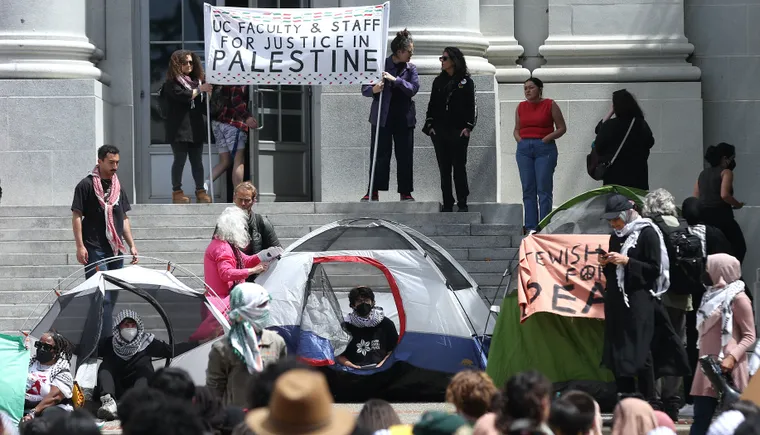Dive Brief:
- A free speech advocacy center based at Columbia University is suing the U.S. Department of Education for the release of guidance and documents relating to the agency’s handling of campus protests.
- The Knight First Amendment Institute Monday filed the lawsuit under the Freedom of Information Act in U.S. District Court, alleging it has “exhausted all administrative remedies” to gain access to the public documents and that the department has stonewalled its request.
- The institute argued that there is “substantial public interest” in the documents to help explain why colleges responded to student protests as they did. It also said the information would clarify what the Education Department believes colleges’ obligations to be in handling ongoing protests.
Dive Insight:
It is not uncommon for the Education Department to issue both public and private guidance on a topic. However, the Knight Institute’s lawsuit alleges that the department’s private guidance to universities on Title VI and how to handle student protesters may be “in tension with the public guidance.”
Title VI of the Civil Rights Act bars discrimination based on race, color or national origin in programs that receive federal funds.
An Education Department spokesperson said Wednesday that the agency has no comment on the pending litigation.
The Knight Institute is seeking extensive Title IV documentation dating back to Oct. 7, 2023, when a surprise Hamas attack on Israel prompted retaliation that swiftly escalated into war in Gaza — and kicked off a new wave of anti-war protests on college campuses in the U.S. The demonstrations also forced higher education to grapple with a corresponding rise in antisemitism and Islamophobia, to varying degrees of success.
Columbia, the institute’s host university, saw some of the country’s most significant protests on its campus and became central to legislators’ investigations into the situations.
The requested documents include all materials related to Education Department decisions regarding potential and actual investigations into alleged discrimination based on shared ancestry or ethnicity.
The department’s Office for Civil Rights opened more than 90 such Title IV investigations involving colleges during the 2023-24 academic year, a sharp uptick from previous years. But OCR has only made a handful of the related documents publicly available, the lawsuit said.
The group is also asking for all communications from colleges to the agency seeking Title VI guidance or clarification and the department’s responses.
“The disclosure of the agency’s communications with universities is important because these communications have shaped universities’ responses to protests and other speech on campus, and will continue to do so,” Scott Wilkens, senior counsel at the Knight Institute, said in a statement Tuesday.
However, the Education Department has not complied, the lawsuit alleges. FOIA gives the agency 20 business days to respond to a request — a time period that has long lapsed.
The Knight Institute, which also focuses on freedom of the press, said it submitted its FOIA request to the department on July 31 and received confirmation of receipt the following day.
The Education Department declined to expedite the process and has yet to decide on the Knight Institute’s request for a fee waiver, according to the complaint.
The department charges 20 cents per page after the first 100 free pages, or $3 for each computer disk, for colleges and media organizations. The documents requested by the institute could hit a page count in the thousands.
The institute received a follow-up email from the department on Aug. 16, and responded with the requested information on Sept. 3.
Since then, there’s been no further communication from the Education Department, according to the lawsuit.
The Knight Institute is asking the court to force the department’s hand and require immediate release of all the requested information.
Its lawsuit comes just days after a congressional committee released scads of public and private responses by university leaders over the student protests.
On Thursday, Republicans on the House Committee on Education and the Workforce issued a scathing 325-page report that published private conversations between college presidents and board leaders.
The committee said its findings show that the leaders of 11 high-profile colleges, including Columbia, failed to protect Jewish students from antisemitism and that their actions likely violated Title VI.

